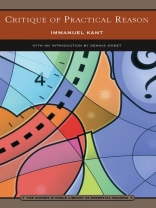Critique of Practical Reason is the second of Immanuel Kants three critiques, the three pillars of his Critical philosophy. It reinstates in philosophical discourse the notions of human freedom, God, and the immortal soul – notions which, in the first Critique, had been shown to be unsuitable in their traditional applications. The ideas of pure practical reason and transcendental conditions of our moral activity, are given a home in the
Critique of Practical Reason. Thus, the second Critique is the fulfillment of Kants important promise in the first Critique, ‘to deny knowledge, in order to make room for faith.’
Giới thiệu về tác giả
Immanuel Kant (1724-1804) has been caricatured as a stiff German professor, whose Stoic habits were so predictable that the people of Königsberg, his hometown, could set their clocks by his daily walks. Kants life is best described as a heroic struggle to discover order within chaos or, better, an effort to fix human thought and behavior within it proper limits. He lived and worked during the Enlightenment, a time when political, religious, and intellectual freedom erupted across the Western world












